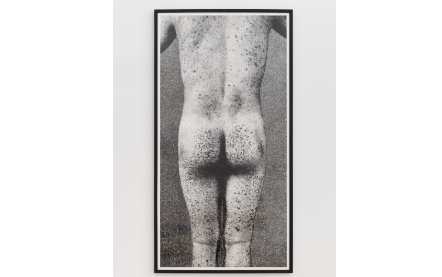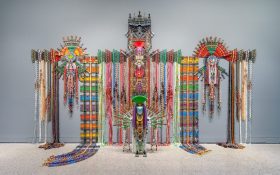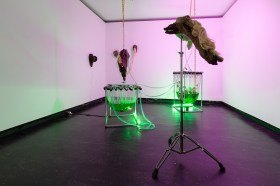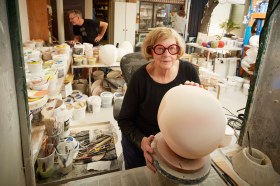As First Nation creatives, we work across a variety of mediums where painters are dancers and writers are photographers. Our art expression operates within the continuum of the oldest living culture on this planet and is multidisciplinary. Dean Cross is no exception. Cross’ recent show Sad State encompasses multimedia and is on view at the Canberra Contemporary Art Space, Lakeside until 14 October.
Cross is interested in the collision of materials, ideas and histories. Through his artworks he challenges the gallery viewer to consider the role of Indigenous culture within the broader dominant culture and how the two rub, complement or collide with each other. The focus of this exhibition is on the themes of storms, stains and silence, and features drawings, prints, photography and a found object.
When viewers enter the gallery space, the found object, a deconstructed Yamaha piano, immediately draws attention. Cross has meticulously taken the piano apart and laid each component out across the gallery floor. He explains that the intention is not to destroy the object, but to deconstruct it with the option of reconstructing it later. On the walls there are artworks of mixed media, etchings and a photograph.
The next eye-catching piece is a large black and white photograph, The Stain (2022). The image is of the back of a naked body and the viewer learns the individual is suffering from scurvy. The body is spotted, one of the symptoms of the disease. The other works comprise a charcoal drawing, a self-portrait of the artist wearing a paper bag and etched works.
As a viewer it is hard not to focus solely on the deconstructed object and, judging from the other gallery visitors in the space, I wasn’t alone. Through an Aboriginal lens, for this reviewer the piano and black and white photograph may have been enough to convey the artist’s intent. I read the disease symptoms not as scurvy but an affliction of smallpox – a virulent disease that decimated much of the Aboriginal community in Sydney at the time of invasion. Similarly, I read the various pieces of the piano laid out on the gallery floor as depicting Country – the small felt circular pads, hammers and pedals symbolising landmarks or features. The piano bass and treble strings resemble water reeds bundled, ready to weave.
Cross invites the viewer to ponder each part of the piano. To spend time, sit with each piece, to pay attention and appreciate that the piano itself is not possible without the sum of its parts, a group interacting with each another, better than acting in isolation. Possibly it’s a subtle message that it takes all of us to play our part in making sweet music, to sing as one voice.
Read: Exhibition review: Open Borders, John Curtin Gallery
I have been fortunate to recently learn of Cross’ art practice, first through his video installation Sometimes I Miss the Applause and also his set design for the Australian Dance Theatre’s Savage. Both were very successful and conveyed the artist’s intent.
However, this is not the case in Sad State. Apart from the deconstructed piano and large-scale black and white photograph, it is unclear how each of the works relate to one another to convey the themes. While Sad State exposes gallery visitors to a collision of material, ideas and histories, to consider an alternative understanding of dominant histories – this reviewer looks forward to where Cross will lead us to next.
Dean Cross, Sad State, is on view at Canberra Contemporary Art Space, Lakeside from 24 August to 14 October; free.
This review is published under the Amplify Collective, an initiative supported by The Walkley Foundation and made possible through funding from the Meta Australian News Fund.





